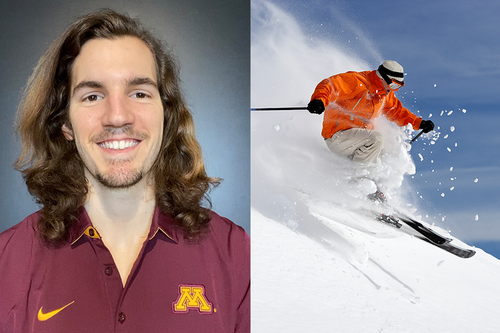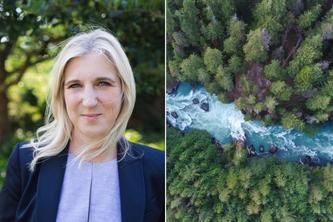
In his final semester at the School of Kinesiology, honors student Brian Neff was awarded an Undergraduate Research Opportunities Program (UROP) grant to help fund his honors thesis research.
“I was first introduced to research working in Dr. Diane Wiese-Bjornstal’s Sports Medicine Psychology Lab,” Neff says. “I worked closely with a graduate student and helped with her project. I really enjoyed it. After that experience I knew I wanted to do my own research.”
Inspired by his interest in the book The Body Electric and his passion for snow sports, he came up with his thesis idea: understanding how chromotherapy (or “light therapy”) might improve performance for alpine skiers. He developed a test to measure lower-extremity strength and balance performance for skiers while they are wearing a variety of different colored lenses.
“There was a gap in the literature and understanding of how color therapy might improve or affect a skier’s performance,” Neff says. “I thought that this would be especially relevant for skiers. They’re often wearing different goggles and lenses, and skiing in a wide variety of visibility conditions.”
Neff is an avid snowboarder, a certified personal trainer, and has spent previous semesters as an intern for Cal Dietz, the associate director of athletic performance for men’s and women’s ice hockey.
“I’ve always been interested in sport performance,” Neff says. “But there’s not really the same emphasis on strength and performance when you get into extreme sports. I think it’s a missed opportunity.”
Neff’s thesis advisor was Chris Lundstrom, whose areas of research include endurance training and performance, exercise physiology, and sports science.
“Brian has approached this project with immense energy and passion,” Lundstrom says. “It’s so fulfilling to work with students like him who are driven, curious, and willing to put in the necessary work required to pursue interesting and novel questions.”
With a freeze at the time on undergraduate research due to COVID-19, Neff was not able to complete his testing, but the project has illuminated possibilities for him in the future.
“This has made me more interested in human performance, everything that influences that, and how complex it is,” he says. Particularly how connected the field of kinesiology is with other scientific disciplines like neuroscience.”
Neff graduates not only with a kinesiology degree, but with minors in sports coaching and applied music—with an emphasis in classical guitar.
“I’d like to get more experience with coaching to apply the concepts that I’ve been studying,” Neff says. “Trying to find a way to use those tools and actually improve an individual’s performance is ultimately what is fulfilling to me. I know I don’t want to be a strength coach forever, but I really enjoy working with people.”
- Categories:
- Science and Technology
- Research





